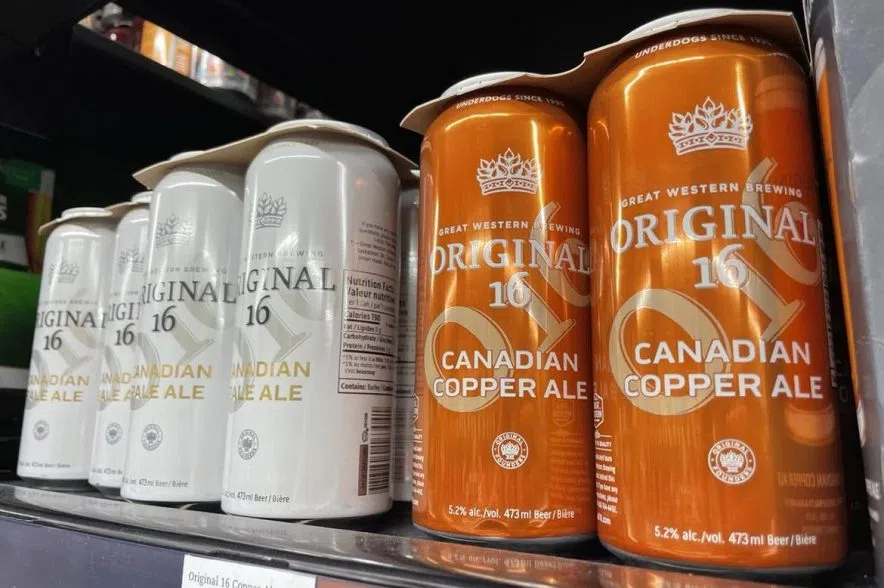As the pressures of tariffs continue and some beverages remain off-limits in Saskatchewan, what sort of toll is it all having on Saskatchewan brewers?
Michael Brennan, president & CEO of Great Western Brewing Company Ltd., joins Evan to offer a local perspective on tariffs hitting his industry.
Listen to Michael Brennan on The Evan Bray Show:
EVAN BRAY: We often talk about the impact that tariffs have on alcohol decision-making. What has it been like for you and your proud Canadian company located in Saskatchewan with the impact of tariffs? How is it impacting your business?
BRENNAN: We’ve had multiple impacts over the last little bit. Obviously, I know on your show, you were talking about the American name brands last week. We got the unintended impact of people loading shelves with beers that were worried they wouldn’t be able to get.
It’s important to look at the intention of the Saskatchewan government when they rolled that out. The intention really was in a time where we’re really trying to focus and support on the Canadian brands, it’s as important to think about where the profits from the companies that are selling you products remain.
That points you to a company like ours in Saskatchewan. Where you can have great-tasting beer, but it’s 100 per cent Saskatchewan-owned and 100 per cent operated here in the province. That was the message we were trying to get through. I would encourage customers to consider that when they’re going out to buy their beer the next time and support local. We’re not the only great brewery here in this province. We’ve got a number of breweries across Saskatchewan that make great beer, and I think it’s worthwhile supporting.
Hearing you say that makes me smile because I’ve learned quickly that it’s a pretty close-knit community, the brewing community in the province, isn’t it?
BRENNAN: It really is. I have a long-standing belief that we’re better together, helping each other grow the industry here in the province.
What has the impact been on Great West Brewing Company when it comes to the trade war? Have you seen any increases in any of the prices of ingredients? Or any of the things that you have to bring together to churn your product out?
BRENNAN: Yeah, and I would tell you there’s really kind of the core parts of making a great beer. You start with great barley and we are blessed with our location in being able to get the best barley.
We require all of our barley to be sourced from Western Canadian farms and so that obviously doesn’t have much of an impact.
Growing conditions are more of our concern and I am always looking for the best growing conditions every year for our farmers.
The one area that we aren’t able to source completely locally is our aluminum cans. So, we do purchase our aluminum cans out of Calgary, Alberta. However, in a weird way, the aluminum comes from its raw form, mined in Quebec, down to the U.S. for processing into steel rolls, and then up to Calgary for processing into the aluminum can. So, that means we do get caught in this tariff war and as they keep going back and forth with 25 per cent more from each side, it will impact our business. We’ve seen that increase start to occur this year and are concerned, as it moves forward in the next few months, that it doesn’t continue, is really our hope.
What about hops? Do you get your hops from Canadian sources?
BRENNAN: We have. There’s one farm here in Moosomin, Saskatchewan, where we get as much hops as we can. Unfortunately, they are still a very small operation. JGL Shepherd Farms is doing great work and growing, but because of the amount of hops we need in our processing each year, we source from both the U.S. a very small amount, but primarily Europe.
Both Germany and France are where a lot of our hops come from. So, we’re reasonably unexposed at that point. I would tell you, strangely, in our industry, the only input has not gone up in price in the last couple of years is hops. We hope that remains. It’s not a big part of our production.
Are there barriers in place within our country that prevent you from moving your product from coast to coast?
BRENNAN: There are two barriers. The first one is that it’s expensive to move beer because it is heavy. That being said, each province has different rules on how they operate, whether they’re government controlled liquor stores versus independent.
I would tell you in a more open system — Alberta, Saskatchewan — we’re working directly with the biggest retailers and that makes it easier to bring our product into those markets.
When you look at somewhere like British Columbia, 50 per cent of their stores are government controlled. It’s a more difficult conversation. There’s less appetite or interest in bringing in brands, even brands that are in the top 10 in Canada. We have difficulty finding a location on shelves in B.C. liquor stores. I’m hoping that will change with the activity going on between provinces and trying to break down some of those barriers.
Read More:
- Shelter update, shortened paid parking hours to be discussed at City Hall
- ‘Could be their last chance’: Regina man frustrated with addiction treatment wait times
- City council axes carbon tax for Saskatoon Light & Power customers
*This interview has been edited due to length and clarity.











